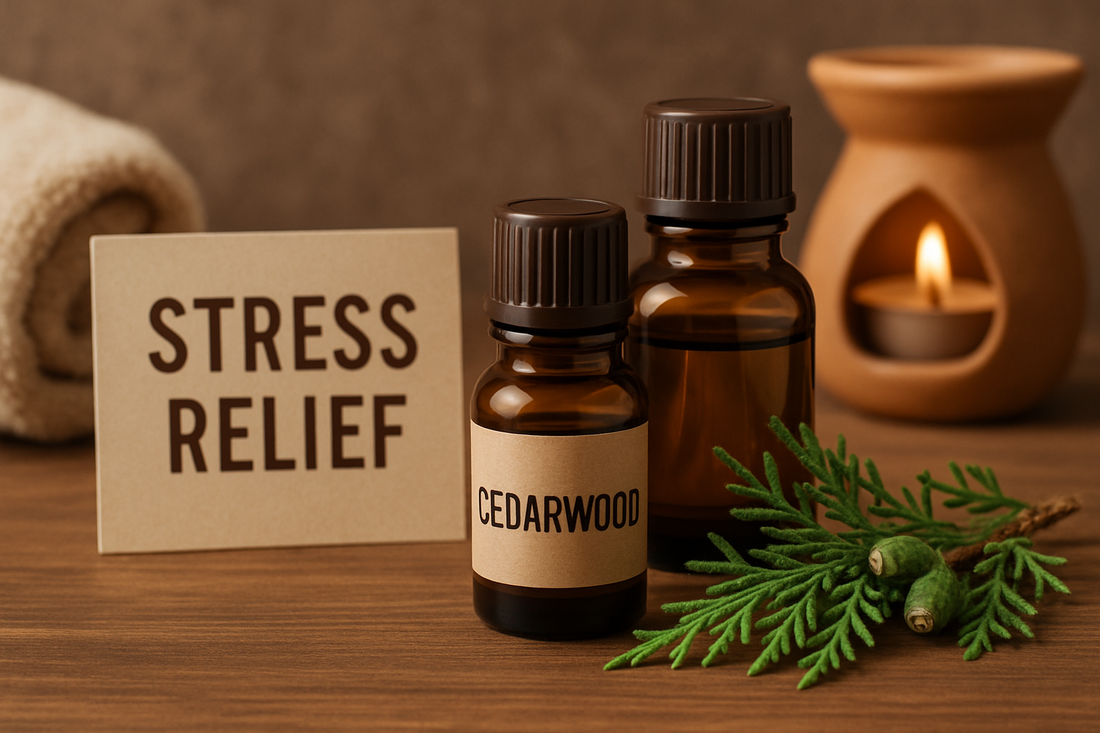Understanding Cedarwood Essential Oil's Therapeutic Properties
Cedarwood essential oil emerges as a potent botanical ally in the quest for stress alleviation. Extracted from the heartwood of various cedar species, this aromatic essence carries profound therapeutic compounds that interact synergistically with our neurological pathways. The oil's primary constituents—cedrol, cedrene, and thujopsene—create a complex molecular symphony that promotes tranquility and mental equilibrium.
The olfactory system serves as the gateway for cedarwood's stress-relieving mechanisms. When inhaled, these volatile compounds traverse the nasal passages and stimulate the limbic system directly. This ancient brain region governs emotional responses, memory formation, and stress regulation. The sesquiterpenes present in cedarwood essential oil demonstrate remarkable affinity for calming neural activity, making it exceptionally effective for stress management protocols.
Scientific research validates cedarwood's anxiolytic properties through multiple pathways. Studies indicate that regular exposure to cedarwood aromatherapy can modulate cortisol levels—the body's primary stress hormone. Additionally, the oil's grounding fragrance profile helps anchor scattered thoughts and promotes cognitive clarity during overwhelming situations.
The Science Behind Aromatherapy and Stress Reduction
Aromatherapy functions through sophisticated neurochemical processes that directly influence our stress response mechanisms. The human olfactory bulb connects intimately with the amygdala and hippocampus—brain structures pivotal for emotional processing and memory consolidation. This anatomical relationship explains why aromatic molecules can trigger immediate psychological shifts.
When cedarwood essential oil molecules bind to olfactory receptors, they initiate cascade reactions within the nervous system. These interactions stimulate the production of neurotransmitters like serotonin and dopamine, which naturally counteract stress-induced biochemical imbalances. The parasympathetic nervous system becomes more dominant, promoting the body's rest-and-digest response.
Neurological Pathways of Aromatic Healing
The trigeminal nerve system also plays a crucial role in cedarwood's therapeutic efficacy. This cranial nerve network responds to chemical stimuli and influences autonomic functions including heart rate, blood pressure, and respiratory patterns. Cedarwood's woody, balsamic aroma activates these pathways, encouraging physiological relaxation.
Research demonstrates that consistent aromatherapy practice can create lasting neuroplastic changes. Regular exposure to stress-relieving essential oils like cedarwood may strengthen neural circuits associated with emotional regulation and resilience.
Holistic Approaches to Stress Management
Effective stress management requires comprehensive strategies that address both immediate symptoms and underlying causes. While cedarwood essential oil provides excellent acute relief, combining it with complementary wellness practices amplifies its benefits exponentially.
At DivyaHerb, we understand that true wellness emerges from integrating time-tested herbal wisdom with modern lifestyle demands. Our carefully curated collection of stress-support supplements works synergistically with aromatherapy practices to create robust stress management protocols. These traditional formulations, rooted in Ayurvedic principles, address stress from multiple angles—supporting adrenal function, balancing cortisol rhythms, and nourishing the nervous system.
The adaptogenic herbs in our stress-support collection complement cedarwood aromatherapy beautifully. Ashwagandha helps regulate cortisol production, while Himalayan Shilajit provides essential minerals that support nervous system function. When combined with cedarwood's aromatic benefits, these supplements create a comprehensive approach to stress resilience.
Integrative Wellness Protocols
Modern stress manifests through multiple channels—physical tension, mental overwhelm, and emotional depletion. Addressing these interconnected aspects requires multifaceted approaches. Cedarwood essential oil addresses the immediate sensory and neurological components, while herbal supplements provide deeper systemic support.
Consider incorporating breathing exercises during cedarwood aromatherapy sessions. Deep diaphragmatic breathing enhances the absorption of aromatic molecules while simultaneously activating the vagus nerve—a key pathway for stress recovery.
Practical Applications and Usage Methods
Maximizing cedarwood essential oil's stress-relief benefits requires understanding optimal application methods and dosage considerations. Different delivery mechanisms offer varying intensities and durations of therapeutic effect.
Diffusion Techniques
Ultrasonic diffusers represent the most effective method for dispersing cedarwood's aromatic compounds throughout living spaces. Add 3-5 drops to your diffuser reservoir for gentle, sustained aromatherapy. The ultrasonic vibrations create fine mist particles that remain airborne longer, ensuring consistent exposure to therapeutic molecules.
For immediate stress relief, consider steam inhalation methods. Add 2-3 drops of cedarwood essential oil to a bowl of steaming water, cover your head with a towel, and inhale deeply for 5-10 minutes. This concentrated approach delivers higher concentrations directly to olfactory receptors.
Topical Applications
When properly diluted, cedarwood essential oil can be applied topically for enhanced therapeutic absorption. Create a stress-relief massage blend by combining 2-3 drops of cedarwood oil with 1 tablespoon of carrier oil like jojoba or fractionated coconut oil. Focus application on pulse points—wrists, temples, and behind the ears—where blood vessels lie close to the skin surface.
One of our most popular stress-management supplements perfectly complements topical cedarwood applications. Our premium Ashwagandha extract provides internal support for stress resilience while the aromatic cedarwood works externally to create immediate calming effects.
This dual approach—combining internal adaptogenic support with external aromatherapy—creates synergistic effects that surpass either method alone. The ashwagandha works at the cellular level to modulate stress hormone production, while cedarwood provides immediate sensory relief and nervous system calming.
Safety Considerations and Best Practices
While cedarwood essential oil demonstrates excellent safety profiles for most individuals, understanding proper usage guidelines ensures optimal benefits without adverse effects. Essential oils are highly concentrated botanical extracts that require respectful handling and appropriate dilution.
Pregnancy and nursing mothers should consult healthcare providers before incorporating cedarwood aromatherapy into their wellness routines. Although generally considered safe for topical and aromatic use, individual sensitivities can vary significantly.
Quality and Purity Standards
Source quality dramatically impacts therapeutic efficacy and safety. Authentic cedarwood essential oil should be steam-distilled from sustainably harvested cedar wood, free from synthetic adulterants or chemical solvents. Look for oils that provide complete botanical names—Juniperus virginiana (Eastern Red Cedar) or Cedrus atlantica (Atlas Cedar)—rather than generic "cedarwood" labeling.
"The quality of essential oils determines their therapeutic potential. Pure, properly extracted cedarwood oil contains the full spectrum of beneficial compounds that make it so effective for stress relief." - Traditional Aromatherapy Wisdom
Proper storage extends oil longevity and maintains therapeutic potency. Keep cedarwood essential oil in dark glass bottles, away from heat and direct sunlight. Refrigeration can further extend shelf life, particularly in warm climates.
Complementary Stress-Relief Strategies
Cedarwood aromatherapy works exceptionally well as part of comprehensive stress management programs. Combining aromatic therapy with other evidence-based approaches creates robust resilience against chronic stress patterns.
Mindfulness and Meditation Practices
The grounding aroma of cedarwood naturally supports meditative states and mindfulness practices. Its woody, earthy fragrance helps anchor attention to the present moment while quieting mental chatter. Consider diffusing cedarwood during meditation sessions to deepen relaxation and enhance focus.
Progressive muscle relaxation techniques pair beautifully with cedarwood aromatherapy. The oil's sedative properties complement systematic tension release, creating profound states of physical and mental tranquility.
Sleep Hygiene Enhancement
Quality sleep represents perhaps the most crucial factor in stress recovery and resilience building. Cedarwood essential oil's naturally sedating properties make it excellent for evening relaxation routines. Diffuse the oil 30-60 minutes before bedtime to signal the nervous system that it's time to transition into restorative modes.
Create a bedtime aromatherapy ritual by combining cedarwood with other sleep-supporting essential oils like lavender or bergamot. This aromatic symphony can help establish consistent circadian rhythms and improve overall sleep architecture.
Frequently Asked Questions
Understanding common concerns about cedarwood essential oil usage helps maximize its stress-relief benefits while ensuring safe, effective application.
| Question | Answer |
|---|---|
| How quickly does cedarwood oil work for stress relief? | Most people experience noticeable calming effects within 5-15 minutes of inhalation, with peak benefits occurring after 30-45 minutes of consistent exposure. |
| Can I use cedarwood oil daily? | Yes, cedarwood essential oil is generally safe for daily use when properly diluted and applied according to recommended guidelines. |
| Does cedarwood oil interact with medications? | While topical and aromatic use rarely causes interactions, consult your healthcare provider if you take medications for anxiety, depression, or sleep disorders. |
The versatility of cedarwood essential oil makes it suitable for various stress-relief applications throughout the day. Morning diffusion can help establish calm focus for challenging workdays, while evening use supports relaxation and sleep preparation.
Remember that individual responses to aromatherapy can vary based on personal sensitivity, stress levels, and overall health status. Start with lower concentrations and gradually increase as you become familiar with cedarwood's effects on your unique physiology.
Combining cedarwood aromatherapy with other stress-management tools—whether herbal supplements, meditation practices, or lifestyle modifications—creates comprehensive approaches that address stress from multiple angles. This integrative strategy often provides more sustainable, long-term benefits than relying on any single intervention alone.
















































